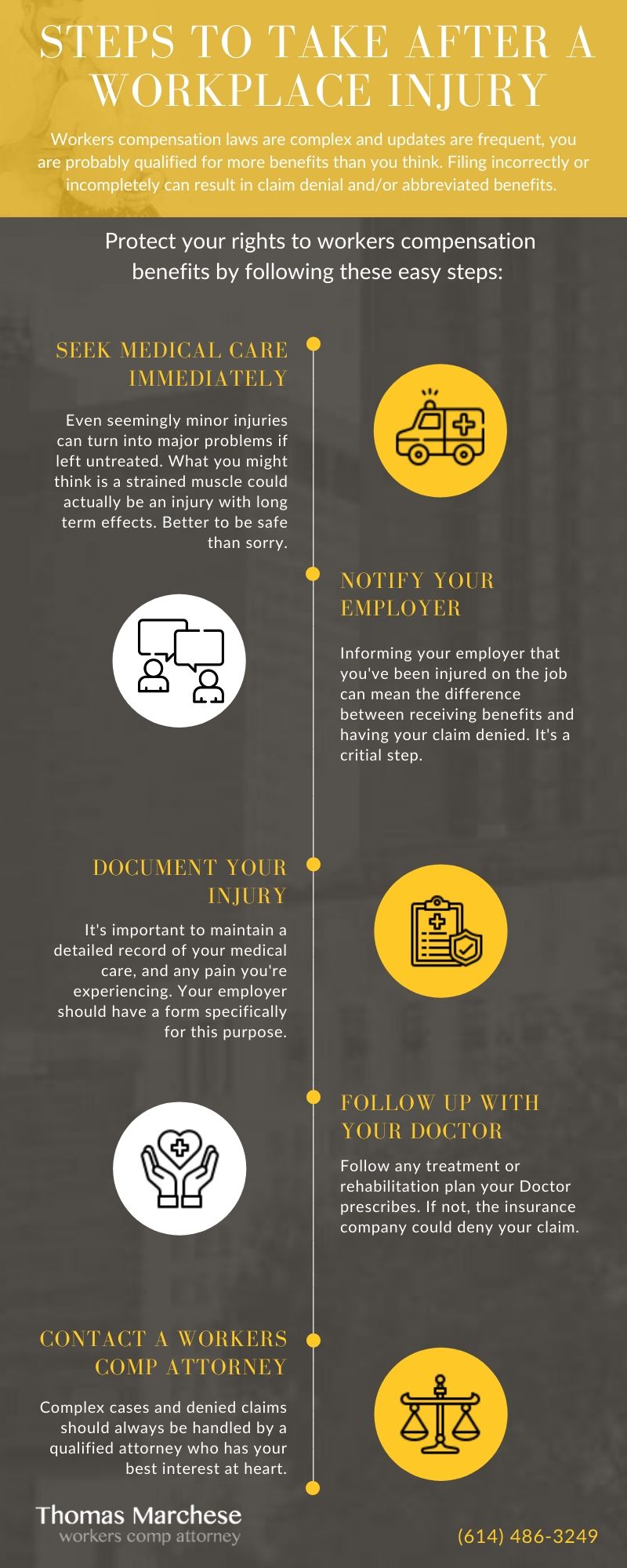If your workers comp claim was denied, you should know you don’t have to take no for an answer.
The Workers’ Compensation system is complex, and your claim could be turned down for any number of reasons, but what you may not know is that if your claim is denied, you have the right to appeal this decision.
1. Your injury didn’t happen at work
To be eligible for workers’ comp benefits, your injury must have happened while you were performing your job duties.
For example, if you work in a restaurant and twist your knee while taking dishes to the kitchen, it’s likely you’re owed benefits. On the other hand, if you were injured while you were on your lunch break or on your commute to work, then you’re most likely not eligible to make a claim.
However, there is a grey area around this rule. If you were not at your jobsite but you were at a work assignment or event, such as a company retreat, you might have a claim.
You should keep in mind that insurance companies, and even your employer, might work very hard to try to prove that you were not at work when your injury happened, even if you know you were.
In a case where there are no witnesses or security camera footage, it can be difficult to challenge this decision. However, an experienced workers’ compensation attorney can be a powerful force in having this decision reversed.
2. You didn’t notify your employer of your injury within the required time
There are certain time limits in the workers’ compensation claim process. After you’re injured, it’s extremely important that you inform your employer about the injury as soon as you are able to. If you don’t report your injury as soon as possible, a number of things can happen.
Firstly, your employer will not be able to carry out an accident investigation, which is vital for the success of your claim.
Secondly, your employer, and the insurance company, can try to claim you were not really hurt at work, arguing that if you were hurt at work you would have reported the issue sooner.
Finally, the insurance company can try to claim your injury didn’t happen due to your job duties and argue that they were the result of a pre-existing condition or something that happened while you were off the clock.
3. You were intoxicated or under the influence of alcohol or drugs
Workers’ compensation is not about finding someone to blame. However, if alcohol or drugs were involved in your accident, you are not entitled to make a claim.
When you go to the doctor for a work injury, your boss has the right to require that you are tested for alcohol and/or drugs. If tests show that you were under the influence when the injury happened, then your claim will typically be denied.
4. You were not treated by an approved medical provider
Under the workers’ comp system, your boss and the insurance company have the right to provide you with an approved list of doctors you can visit to receive treatment.
In some instances, this may be a negative thing because these doctors can try to downplay your injuries, which means you could receive lower benefits.
Although you have to see an approved medical provider to be entitled to compensation, having the help of a workers’ comp lawyer will guarantee you the best chance of getting the treatment you require and the benefits you are entitled to.
5. You never received medical treatment
While you don’t have to see a doctor for every small scrape or bruise you get at work, if you think your injury is entitled to a claim, you will need the medical records to prove it. Without the supporting medical records, the insurance company can say you faked your injury to claim benefits, resulting in a denied claim.
Make sure you give your claim the best shot of being successful and visit a doctor.
6. You never filed your paperwork or failed to do so on time
There are specific time limits and deadlines for when you have to file your Workers’ Compensation claim. Even for injuries that develop slowly over time, like carpal tunnel syndrome, time limits apply.
If you do not file your papers on time, you are giving your employer and the insurance company another reason to deny your claim.
If you work with a Workers’ Compensation attorney they will be able to make sure you have all of your papers in order and that they are filed on time.
7. Your injury was the result of horseplay, roughhousing or practical jokes
If you’re goofing around at work and ended up getting hurt, it is unlikely that your injuries will be covered. In the eyes of the law, you are not considered working while you are roughhousing. So what can seem like fun and games can end up causing major stress later.
Similarly, if you start a fight at work and you get hurt, you generally will not be eligible for benefits.
8. Your injury is from a pre-existing condition
If you had an injury or illness before starting your job and your job did not make it worse, you are typically not eligible for workers’ compensation. The insurance company can and will fight very hard to get your claim rejected using this argument.
However, workers’ comp claims are complex and there is a lot of gray area. Some employees who are entitled to benefits see their claims rejected and do not fight back. Do not make this mistake.
9. Your employer disputes your claim
Your employer can, and most likely will, dispute your claim. They may be afraid that the cost of their workers’ comp coverage will increase if there is a claim on their policy. To combat this they could argue that the details of the case are incorrect or that you were not at work when you got injured.
This point can be especially true if there are no witnesses or surveillance footage to support your claim. If you were hurt and no one saw it, make sure you tell your employer and co-workers what happened as soon as possible.
10. You did not have a workers comp attorney
You do not have to have a workers’ compensation attorney to file a claim, but having one will definitely increase the chances of your claim being successful.
An attorney will be able to guide you through the process and advise you on the different steps and documents you need to give your claim the best chance of being successful.
If your claim has been denied, call Thomas Marchese. We can give you advice and we will improve the likelihood of your appeal being successful.






